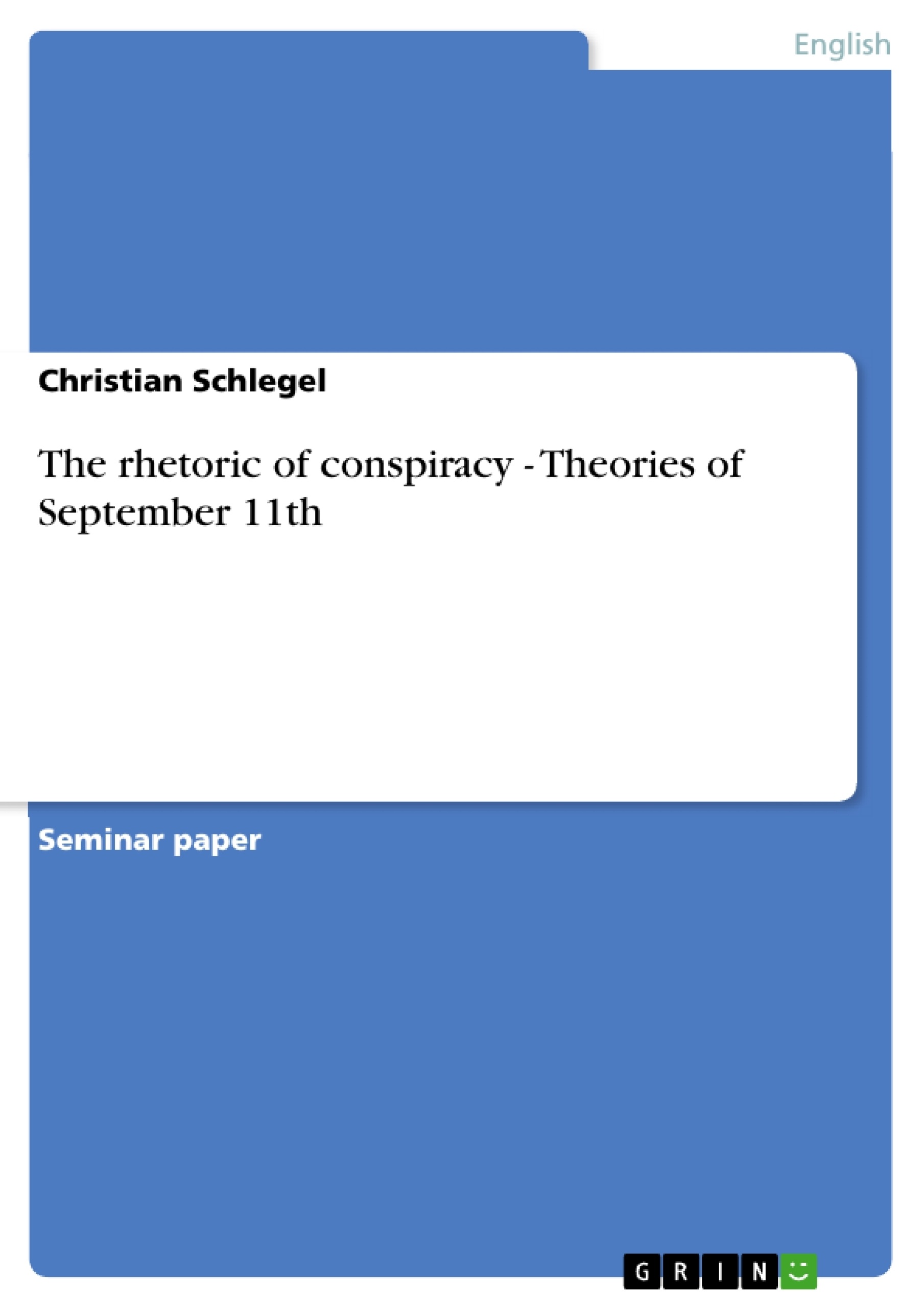On September 11th 2001 the terrorist attacks in New York and Washington, destroying the World Trade Center, heavily damaging the Pentagon, and killing almost 3.000 people, shocked the world and had a lasting effect on national and international politics of the United States. In short time, thousands of websites appeared on the internet and are still online, each offering its own truth about what had happened: Some claim having seen Satan himself in the flames and the smoke that rose from the burning twin towers, saying that the attack was just the beginning of the end of the world. Others use anti-Semitist sentiments and report about a Jewish plot following Zionist ideology. Again others blame the US-government for not preventing or even carrying out the attacks in order to justify their later wars on the Taliban regime and on Iraq. Some even talk about the involvement of an alien race.
This seminar paper will begin by providing a theoretical background on conspiracy theories and suppose a thesis how those theories influence people and seduce them to believe. Rhetorical features will be taken into account as well as psychological features. After the outlining of the theoretical background, an overview of several conspiracy theories, connected with the events of September 11th 2001, will be given. Each theory will be individually discussed and examined in regard of its use of language and how historical facts and findings are mixed up with clichés and biased subjective opinions of the authors. In the end there will possibly be a common scheme to identify of how the writers and publishers of such theories succeed in winning so many supporters.
Inhaltsverzeichnis (Table of Contents)
- I Introduction
- II Theoretical Background
- 1.1 What is a Conspiracy/Conspiracy Theory?
- 1.2 What makes a Conspiracy Theorist?
- 1.2.1 The Psychological Effect of Grave Events
- 1.2.2 Accessibility and Distribution
- 1.2.3 The American Tradition of Conspiracy Thinking
- III Conspiracy Theories of September 11th
- 2.1 Fulfilment of Bible Prophecies
- 2.1.1 Satan in the Smoke
- 2.1.2 9/11 in the Bible
- 2.1.3 The WTC-Attack in the Bible Code
- 2.2 A Work of the Illuminati
- 2.2.1 Who are They?
- 2.2.2 Traces of Their Involvement
- 2.3 A Conspiracy by the Government
- 2.3.1 The Failure of the CIA
- 2.3.2 Quick Evidence and More Gains than Losses
- 2.1 Fulfilment of Bible Prophecies
- IV Conclusion
Zielsetzung und Themenschwerpunkte (Objectives and Key Themes)
This seminar paper aims to analyze the rhetoric of conspiracy theories related to the September 11th attacks, examining how they influence people and persuade them to believe. The paper focuses on the rhetorical and psychological features of conspiracy theories, exploring their construction and impact.
- Definition and characteristics of conspiracy theories
- The psychological impact of significant events on individuals and society
- The role of language and rhetoric in promoting conspiracy theories
- The historical context and cultural influences of conspiracy thinking
- The analysis of specific conspiracy theories surrounding the September 11th attacks
Zusammenfassung der Kapitel (Chapter Summaries)
- Introduction: This chapter introduces the topic of conspiracy theories and provides historical examples of their prevalence in American culture, from the Bavarian Illuminati to the moon landing conspiracy. It sets the stage for exploring the September 11th conspiracy theories, emphasizing their impact on public perception and international politics.
- Theoretical Background: This chapter defines the term "conspiracy theory" and examines its components, including the role of reasoning, speculation, and the targeting of powerful elites. It further delves into the psychological aspects of conspiracy theories, analyzing the factors that influence individuals to embrace them.
- Conspiracy Theories of September 11th: This chapter explores various conspiracy theories surrounding the September 11th attacks. It examines claims linking the attacks to biblical prophecies, the Illuminati, and government involvement. Each theory is analyzed in terms of its use of language, historical facts, and subjective opinions.
Schlüsselwörter (Keywords)
The primary focus of this work lies in the analysis of conspiracy theories related to the September 11th attacks. Key terms and concepts include: conspiracy theory, rhetoric, psychology, historical context, American culture, September 11th, World Trade Center, Pentagon, Illuminati, Bible prophecies, government involvement, propaganda, and media.
Frequently Asked Questions
What are the most common conspiracy theories about 9/11?
Theories range from religious claims (Satan in the smoke) and anti-Semitic plots to allegations of US government involvement (inside job) or Illuminati interference.
Why do people believe in conspiracy theories after grave events?
The paper explores psychological factors: such events create a need for simple explanations for complex, shocking occurrences to regain a sense of control.
What rhetorical features are used in 9/11 conspiracy texts?
Authors often mix historical facts with clichés, biased opinions, and persuasive language to win supporters and create an "alternative truth."
What is the "American tradition of conspiracy thinking"?
The paper provides a background on how conspiracy theories have been a recurring element in US culture, from the moon landing to secret societies like the Illuminati.
How did the internet influence 9/11 conspiracy theories?
The rapid distribution through thousands of websites allowed these theories to spread globally in a very short time, reaching a massive audience.
- Quote paper
- Christian Schlegel (Author), 2003, The rhetoric of conspiracy - Theories of September 11th, Munich, GRIN Verlag, https://www.grin.com/document/78181



